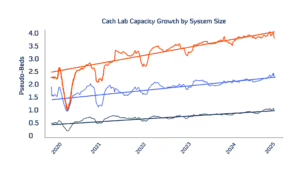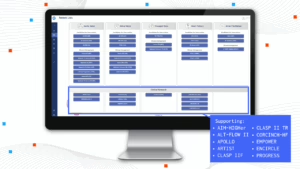egnite, Inc. presented new data on the use of artificial intelligence to predict the progression of aortic stenosis at TCT 2021 conference
AI-powered algorithms are proven to accurately predict the likelihood a patient with moderate AS has progressed to severe AS.
ALISO VIEJO, Calif. – November 8th, 2021 – egnite, Inc. presented new data at the Transcatheter Cardiovascular Therapeutics (TCT) 2021 conference held November 4-6. The presentation showcased the proven accuracy and results of artificial intelligence (AI) powered algorithms to accurately predict the likelihood a patient with moderate aortic stenosis (AS) would later be diagnosed with severe AS over a 1- and 2-year period.
The CardioCare platform, egnite’s flagship product, first launched its predictive suite of algorithms in May 2021. These algorithms are the first of their kind for AS patients and offer a major advancement in structural heart patient management by applying AI to help physicians identify and prioritize the review of moderate AS patients who are at highest risk of progressing to severe disease.
“The moderate AS patient population can be difficult to stay on top of because the patient’s immediate needs are not acute. Clinicians manage large structural heart patient populations, so time prioritization is key to optimizing the number of patients they can impact,” said Mike Dobbles, MSc, chief technology officer, egnite. “I am most proud of this algorithm and the impact that it can have on the quality of care for AS patients.”
Findings from 719,321 de-identified echo exams across the U.S demonstrated the average predicted progression index was 24% and 49%, with observed progression at 23% and 55% for years 1 and 2, respectively. The CardioCare platform’s Disease Progression algorithm was able to successfully predict the progression rates for these populations with an average error of 3.1%. Primary and senior authors leading this study are Soundos Moualla, MD of Dignity Health Yavapai Regional Medical Center, and Matt Brennan, MD, MPH of Duke University School of Medicine, complete findings from the abstract are available in JACC.
“The proven clinical accuracy of these algorithms is exciting for both physicians and AS patients,” said Glenn R. Barnhart, M.D., chief medical officer, egnite. “This algorithm could serve as a useful clinical tool for patients with high progression index scores, allowing physicians to adjust or guide the intensity of follow-up for select moderate AS patients.”
About egnite
egnite is a digital health company focused on providing artificial intelligence solutions to help hospitals identify and manage their most at-risk patients. The company is a market leader in structural heart solutions with a vision to improve the outcomes for every structural heart patient in America. egnite’s flagship AI platform, CardioCare, has partnered with over 50 hospitals nationwide and leverages the program’s big data analytics platform of over one million echocardiograms to elevate the standard of patient care. The company is based in Aliso Viejo, Calif., for more information, visit www.egnitehealth.com.
To view the poster, please click here.
The CardioCare platform is not intended for use in the diagnosis, cure, mitigation, treatment, or prevention of structural heart diseases.
egnite, egnite, Inc., the spark logo, and CardioCare are trademarks of egnite, Inc. All other trademarks are the property of their respective owners.



